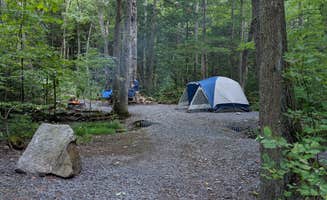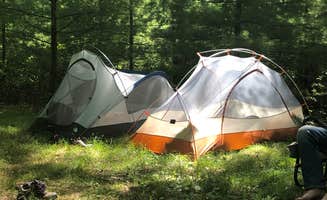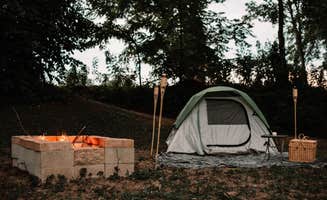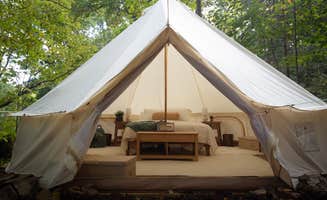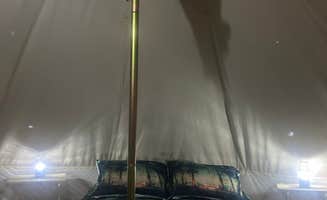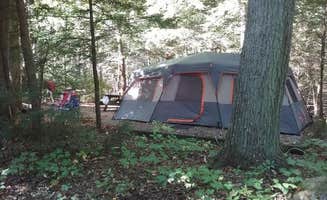Tent campsites near Burnham, Pennsylvania offer remote camping experiences at elevations between 1,500-2,000 feet throughout the Ridge and Valley region of central Pennsylvania. The area receives approximately 40 inches of annual rainfall, creating lush forest environments with peak camping season running May through October. Most primitive camping sites feature natural ground surfaces with pine needle or leaf cover rather than gravel tent pads.
What to do
Stargazing opportunities: At STAR LEE FARM, campers can access a large open field ideal for nighttime astronomy. "There's a huge field to star gaze as well as taking pictures," notes reviewer Tiana S., who adds the location is "very pretty and secluded" with limited cell service that's "perfect for those who want to completely escape the business of modern world."
Creek exploration: Many tent sites provide direct creek access for fishing, wading or wildlife viewing. "There's a nice creek that runs through it," mentions Rebecca G. about Reeds Gap State Park Campground, adding that the campground is "beautiful! It's so peaceful and serene." The park features several easy hiking trails that follow waterways.
Hiking access: Tent sites offer convenient trail access to longer route systems. Danielle C. explains there's "a nice easy hiking trail that follows" the creek at Reeds Gap State Park. Sites typically sit within 0.25-0.5 miles of trailheads, making day hikes accessible directly from campsites without requiring vehicle travel.
What campers like
Midweek solitude: Tent camping during weekdays often provides near-complete privacy. "Stayed here on a Sunday night without a reservation. We were the only ones there," reports Cheryl K. about Ravensburg State Park Campground. The first-come, first-served registration system via honor box makes spontaneous stays easy.
Natural tent pads: Several parks feature slightly raised tent platforms that improve drainage during wet conditions. "They have tent pads which are nice," explains Traci F. about Ravensburg, adding that "there are bushes and trees between the sites and it feels very private."
Clean facilities: Even primitive campgrounds maintain well-kept bathroom facilities. Paula L. from Reeds Gap notes what stood out most was "a super clean, eco-shower. Yep that's right, the shower! Timed water, lights (solar?)etc. are spot on for me!" These energy-efficient facilities remain operational throughout the camping season.
What you should know
Limited cell coverage: Most forest campsites have minimal connectivity. "Put your phone away cuz there's no cell service here!" advises Danielle C. about Penn Roosevelt State Park Campground. Download maps and essential information before arrival as navigation apps may not function reliably in these areas.
Weather preparation: The mountain elevation creates variable conditions year-round. "Driving in I got a little worried I was getting lost, but I drove on," shares Chuck M. about Penn Roosevelt, noting the campground's remote location requires proper navigation. Winter camping remains available at some locations but with reduced services.
Water access varies: During off-season periods, potable water may be unavailable. Chuck M. notes, "The water was off, but I was prepared to wilderness camp later in my trip so, that was no big deal." Always carry at least one gallon per person per day as backup during spring and fall camping trips.
Tips for camping with families
Playground access: Several parks provide play equipment for children. Rebecca G. mentions that Reeds Gap State Park has "picnic pavilions and a playground for the kids!" Sites nearest to these amenities (typically #1-4) fill fastest during summer weekends.
Noise considerations: Creek-side sites provide natural white noise that can help mask normal family sounds. "The sites are spaced out and peaceful," notes Joann from Penn Roosevelt, while Laura from Ravensburg adds there are "plenty of trees that are good for hammocking" and "in a few sites, you can set them up right by the creek, which is my favorite part."
Group camping arrangements: Multiple adjacent sites accommodate larger family gatherings. "It's good for large groups (you can get sites in a row) or just you," explains Laura about Nancy's Boat To Shore Campground, though these waterfront spots "usually book a few weeks in advance" according to Kristen H.
Tips from RVers
Access limitations: Most tent camping areas have restricted vehicle access that limits larger RVs. "If you have a trailer, I do not recommend this spot. There is a very tight hairpin turn on the way in," warns Chuck M. about Penn Roosevelt State Park. "My six foot long trailer barely made the turn!" Smaller pop-up campers under 16 feet typically navigate these roads more successfully.
Road noise factors: Consider site placement relative to nearby roads when booking. KK mentions about Ravensburg that "it's right near a road so you hear car (and horse & buggy!) noise — would try to get a spot further away from the road if possible." Sites furthest from access roads (typically numbered highest) provide the quietest overnight experiences.


